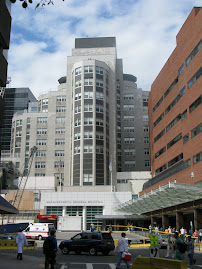These past two weeks have gone by so quickly! There's SO much going on, and I'm still loving it all.
The lab has been pretty much the same for the past few weeks. Right now, we're still working on setting up optimal conditions for the Hippo experiment. I've done a LOT of RNA isolations from different types of tissue (mouse liver, human pancreas) and cells. I have also changed some of the isolation conditions and made minor alterations to the isolation protocol. This is starting to make the isolations more reliable in giving us sufficient amounts of uncontaminated, pure RNA. Some things we have altered are the amounts of tissue used, and the ratio of amount of tissue and lysis buffer. If there is too much of one or the other, the RNA will degrade. We've also changed little parts of the protocol to speed up the entire isolation process.
The most exciting part of the past two weeks was when we ran a RT-PCR and got positive results without any degradation or contamination! This was exciting because it meant we had reliable RNA and cDNA (after the Reverse Transcription step). This allowed us to move on and use the primers in a PCR step that showed us the genes from the Hippo pathway. The PCR results were pretty good. We got some strong bands on the gel, and some not-so-strong bands, so we need to optimize the conditions of the PCR. So, we are working on finding the correct annealing temperatures, and amount of cycles for the PCR in order to amplify sufficient amounts of the Hippo genes. Once we find these conditions, we'll be able to actually run the experiment to compare the Hippo genes in cancerous and non-cancerous pancreatic tissues. There is still a lot more to be done in this optimization process, and it could be a few weeks before we actually run the experiment. Though this is very frustrating at times, it's great to learn how scientific research actually works: There is a lot of error, but we learn from those mistakes and unexpected results to help us reach our final goal.
On Friday, I went on my first clinical rotation. I followed Dr. Dunn (a Brooks alum. and father) around Mass. General's OR. We started the day talking a bit about the administration and organization of the OR. Considering the entire OR is comprised of seven different buildings, keeping things organized and functioning takes a LOT of work. After that, we talked a bit about some of the procedures we were going to see, and then got dressed in our scrubs and went down to the OR.
The first procedure we saw was a Carotid Artery case. Basically, this procedure is used to clean plaque out of the Carotid Artery. Plaque can build up in the artery as a result of many things such as smoking, hypertension, high cholesterol, genetics and more. This procedure can be very dangerous because minor mistakes can cause the patient to stroke. However, in many cases this procedure is necessary in order to prevent an inevitable stroke.
After this, Dr. Dunn pulled me aside and told me about the next case. He told me that the patient had a tumor behind his nose, and that the procedure involved making an incision across the patients hairline, and then essentially peeling down his face so they can reach the tumor from above. He then said that if I was uncomfortable seeing this or if I felt woozy or nauseous at any time, to let him know. Though his description of the procedure made me a bit nervous I said I thought I'd be alright, so we went in. As it turned out, I wasn't at all uncomfortable in the watching the procedure - I was simply amazed. It was incredible to see this unique procedure, and it was awesome to see a procedure that you never really think of when you think of surgery.
The final case we saw was a trauma case. The patient was a motorcyclist and was in a horrible accident in which he ended up in the back of the car in front of him. Though the trauma team didn't know exactly what injuries he had, they had to move quickly, so they basically had to open him up and look around for what they needed to fix. Though this may seem a bit unprofessional, they had a very methodic system and as far as I know, the operation was a success.
Finally, at the end of the day, Dr. Dunn taught me a lot about anesthesiology. This was a great opportunity because I knew nothing about it, and this is one of Dr. Dunn's specialties. We talked about the different drugs, gases, and treatments used during surgeries, and we also talked about anesthesia awareness - when a patient wakes up during a surgical procedure. This can occur for a number of reasons, and is also sometimes done on purpose to save the patients life. This, of course, was really interesting, and although there are a lot of small details I won't understand for at least a few years, I was very intrigued by it all.
Though there's a lot going on, I've also had a chance to go to Nantucket with some friends, and go home for a weekend. I love life in Cambridge/at Harvard, but it was definitely nice to get away for a bit to see family and friends and do a bit of relaxing.
We're approaching midterms at Harvard. Luckily, I only have one, whereas most of the other 8-weekers have two. There's still a lot of studying to be done, so I'm going to do that right now!
Thanks for reading!
-Mike
p.s. I'm hoping to get some pictures up of the lab, Harvard, etc.... So stay tuned!












